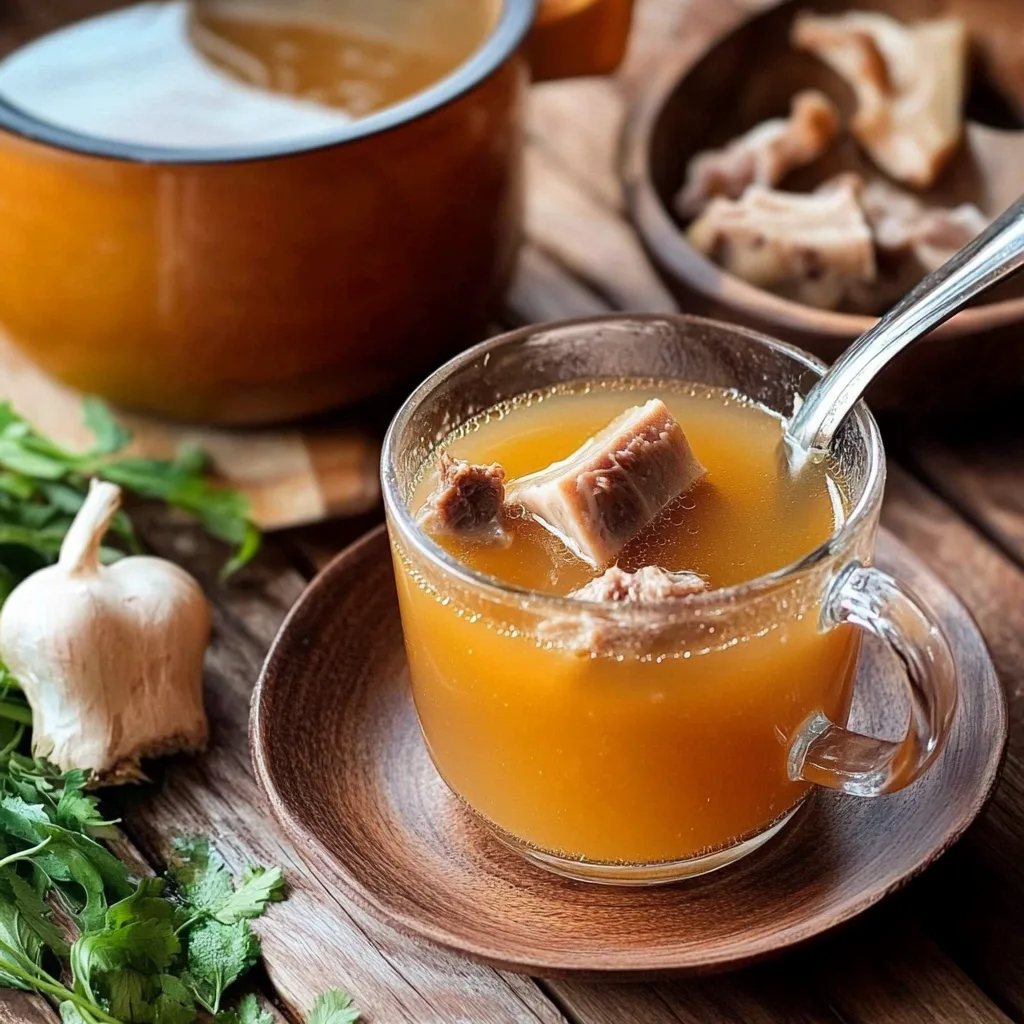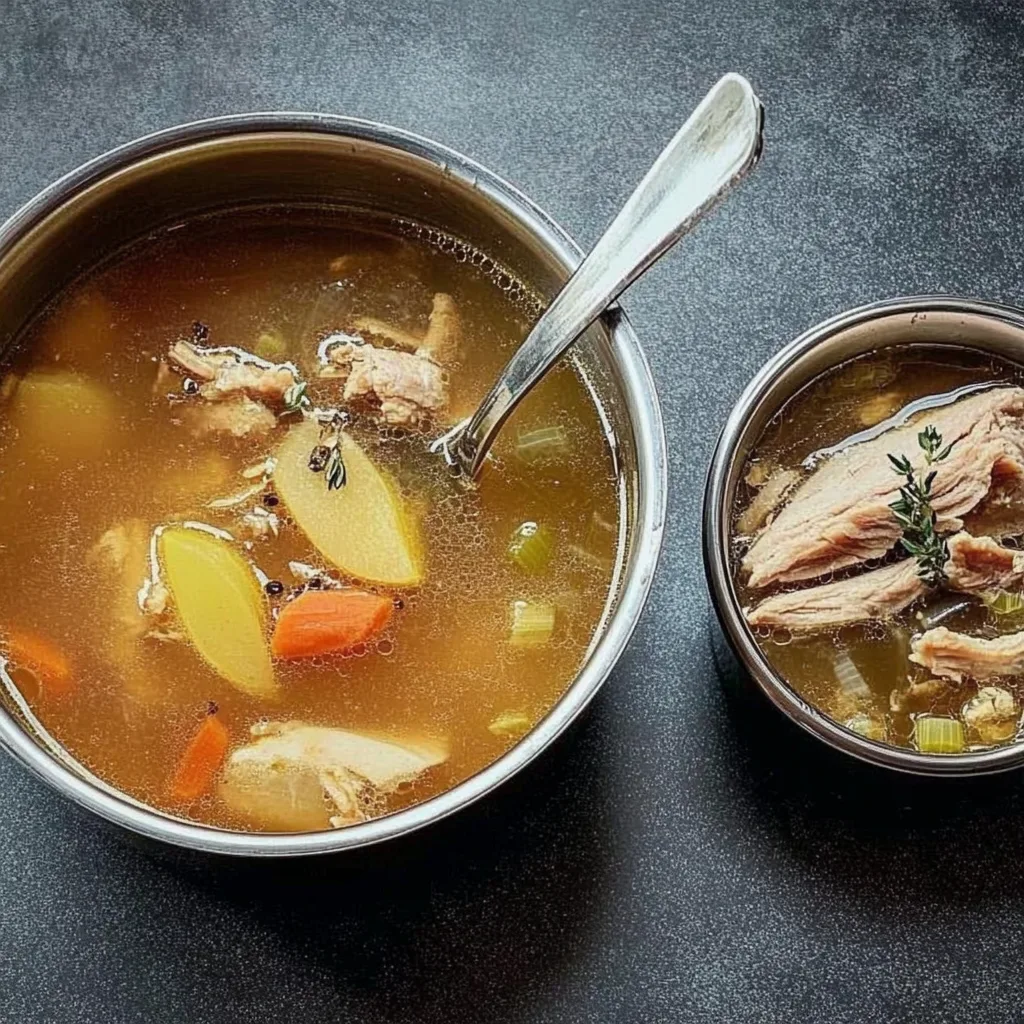Why Do I Feel Weird After Drinking Bone Broth?
Bone broth has become a popular addition to health-conscious diets, praised for its rich nutrients and supposed health benefits. However, not everyone experiences the warm, comforting effects they might expect. For some, drinking bone broth can lead to discomfort or strange reactions, leaving them wondering why this seemingly beneficial drink feels more like a setback.
In this article, we’ll uncover the mystery behind why you might feel weird after drinking bone broth. We’ll explore the common symptoms, potential causes, and actionable tips to enjoy bone broth without the negative effects. Let’s dive in and demystify this health trend!
Table of Contents
Understanding the Basics of Bone Broth
What Is Bone Broth?
Bone broth is a nutrient-dense liquid made by simmering animal bones and connective tissue for an extended period. This slow cooking process extracts collagen, gelatin, minerals, and amino acids, resulting in a rich and flavorful stock. It’s often used as a base for soups or consumed on its own as a health tonic.
The nutrient profile of bone broth includes:
- Collagen, which supports skin, joint, and gut health.
- Glucosamine and chondroitin, beneficial for joint health.
- Minerals like calcium, magnesium, and phosphorus, which are vital for bone strength.

Why Do People Drink Bone Broth?
Bone broth has become a staple in wellness routines for several reasons. It’s believed to improve digestion, promote gut health, and strengthen immunity. Some even tout it as an anti-aging remedy, thanks to its high collagen content.
This popularity is further boosted by diets like keto, paleo, and intermittent fasting, where bone broth serves as a nutrient-rich, low-calorie option to curb hunger and support overall health.
However, the potential downsides of consuming bone broth are often overlooked. While it can be a nourishing beverage, not everyone reacts to it the same way. In the next section, we’ll delve into the common symptoms that some people experience.
Common Symptoms Experienced After Drinking Bone Broth
Digestive Discomfort
One of the most common reactions to bone broth is digestive upset. This can range from mild bloating to more noticeable symptoms like gas or diarrhea. The high levels of collagen and gelatin in bone broth, while beneficial for many, can be difficult for some people to digest, particularly if their gut health isn’t optimal.
Additionally, the fat content in bone broth, especially if it hasn’t been skimmed or separated, can overwhelm your digestive system. This excess fat may lead to stomach discomfort or greasy stools, leaving you questioning, “Why do I feel weird after drinking bone broth?”
Headaches or Lightheadedness
Feeling lightheaded or experiencing a headache after drinking bone broth isn’t uncommon. These symptoms often point to a sensitivity to the sodium found in bone broth. Many recipes rely on generous amounts of salt to enhance flavor, which can cause dehydration or electrolyte imbalances in sensitive individuals.
Histamine reactions may also play a role here. Bone broth is a high-histamine food due to its prolonged cooking time. For people with histamine intolerance, even a small serving can trigger symptoms like headaches or dizziness.
Skin Reactions and Sensitivities
In some cases, bone broth may cause skin reactions such as itching, redness, or breakouts. These symptoms could be due to allergens present in the ingredients, such as spices, vegetables, or the animal source of the bones. People sensitive to glutamate or histamines may notice their skin reacting adversely after consuming bone broth.
Potential Causes of Feeling Unwell
Histamine Intolerance and Reactions
Bone broth is a powerhouse of nutrients, but its long cooking process can lead to high histamine levels. Histamine is a naturally occurring compound that, in excess, can cause symptoms like headaches, hives, or even nausea. If you’re histamine-sensitive, you might find yourself asking, “Why do I feel weird after drinking bone broth?”
Histamine intolerance occurs when your body struggles to break down histamine efficiently. This can be due to a lack of the enzyme diamine oxidase (DAO) or an overabundance of histamine-rich foods in your diet.
Improper Storage and Contamination
Bone broth must be handled with care. If it’s left at room temperature for too long or stored improperly, bacteria can multiply, making the broth unsafe to consume. Symptoms of mild food poisoning, such as stomach cramps or nausea, could explain why some people feel unwell after drinking bone broth.
Freezing your broth immediately after cooking or storing it in airtight containers in the fridge is essential to prevent bacterial growth. Reheating thoroughly before drinking ensures any lingering microbes are eliminated.
Excessive Fat or Grease
Many homemade bone broths contain high levels of fat, especially if the fat isn’t skimmed off during preparation. Drinking this unfiltered fat can lead to greasy, heavy feelings in the stomach, causing digestive upset. Using a fat separator or allowing the broth to cool and skimming the fat layer can reduce this issue significantly.
Nutrient Overload
While bone broth is loaded with nutrients, consuming too much at once can overwhelm your body. Excess minerals, like calcium and magnesium, or an overload of protein can lead to symptoms such as fatigue, nausea, or even digestive disturbances. Balancing your intake and drinking bone broth in moderation can help mitigate these effects.
How to Avoid Feeling Weird After Drinking Bone Broth
Proper Preparation Tips
One of the best ways to avoid discomfort is by preparing bone broth correctly. Always use fresh, high-quality bones from reliable sources to ensure the broth is free of contaminants. During cooking, keep the temperature steady to prevent bacterial growth. Skimming impurities and excess fat while the broth simmers is essential for creating a cleaner, healthier broth.
Once the cooking process is done, consider using a fat separator to remove any remaining grease. This step can significantly reduce the chances of experiencing digestive upset, especially if fat content tends to bother you.
Adjusting Ingredients for Sensitivity
If histamine intolerance or ingredient sensitivity could be the culprit behind “Why do I feel weird after drinking bone broth?”, consider making some adjustments. Use low-histamine ingredients, like fresh herbs instead of aged seasonings, and reduce the cooking time slightly to lower histamine levels.
For those sensitive to sodium, opt for a no-salt version of the broth and add seasoning to taste before serving. These small changes can make a significant difference in how your body reacts to the broth.
Storing and Serving Bone Broth Safely
Proper storage is just as important as preparation. Always refrigerate bone broth within two hours of cooking or freeze it for long-term storage. To maintain safety, reheat the broth thoroughly before drinking, ensuring any potential bacteria are eliminated.
For more tips and tricks on perfecting your broth-based dishes, discover What Do You Do With Chicken Bone Broth?.
FAQs About Drinking Bone Broth
Why Does Bone Broth Make Me Feel Sick?
Several factors could be at play, including histamine intolerance, digestive sensitivities, or improper storage. The high nutrient content can overwhelm your system if consumed in large amounts, especially if you’re not used to such a rich food.
Can Histamine Cause Weird Reactions?
Yes, histamine is a naturally occurring compound in bone broth, especially after long cooking times. If your body struggles to break down histamine, you may experience symptoms like headaches, skin irritation, or digestive upset.
Is Store-Bought Bone Broth Better for Avoiding Symptoms?
Store-bought bone broth can be more convenient and safer for those worried about preparation errors. It’s typically processed in a way that minimizes contamination risks, though it may lack the nutrient density of homemade versions.
What Are the Best Ways to Filter Fat From Bone Broth?
Using a fat separator or allowing the broth to cool and skimming the hardened fat are effective methods. These steps ensure a cleaner broth that’s easier on digestion.
The Science Behind Drinking Bone Broth Reactions
Understanding Food Reactions
Bone broth is packed with essential nutrients, but everyone’s body reacts differently to it. Some people experience sensitivities due to specific components, such as histamines, fats, or minerals. These reactions can depend on several factors, including gut health, overall diet, and pre-existing conditions.
For example, drinking a nutrient-rich broth on an empty stomach may overwhelm your digestive system. This can lead to symptoms like nausea, bloating, or fatigue. If you’ve ever wondered, “Why do I feel weird after drinking bone broth?”—this could be the reason. The body needs time to adjust to the concentrated nutrients, especially if your digestion is already sensitive.
Role of Gut Health in Bone Broth Sensitivities
Your gut health plays a crucial role in how your body processes bone broth. If your gut lining is weakened or your microbiome is imbalanced, breaking down the broth’s rich compounds may be challenging. This can cause symptoms like gas, cramping, or diarrhea.
Certain conditions, like leaky gut syndrome or irritable bowel syndrome (IBS), may make some individuals more susceptible to discomfort after consuming bone broth. To minimize these effects, consider supporting your gut with probiotics, fiber, and proper hydration. Adding variety to your diet with gut-friendly foods, such as fermented vegetables or yogurt, can also improve digestion over time.
The Link Between Histamines and Bone Broth
Histamine intolerance is another reason why bone broth might cause discomfort. Slow-cooked foods, including broths and stocks, tend to have higher histamine levels. This can be problematic for those with histamine sensitivities, leading to headaches, skin flushing, or digestive distress.
If you suspect histamines are the issue, try consuming freshly made broth instead of one that has been stored for a long time. Alternatively, short-cooked broths may have lower histamine content, making them easier to tolerate.
Scientific Studies on Bone Broth Consumption
Although limited, research suggests bone broth offers benefits like gut healing, reduced inflammation, and immune support. However, its histamine content is well-documented, particularly for those sensitive to high-histamine foods. Studies also indicate that individual tolerance to bone broth can vary based on genetic and dietary factors.
One way to test your body’s reaction is by starting with small amounts and gradually increasing your intake. If symptoms persist, switching to alternatives like vegetable broths or collagen supplements might be a better option.
Finding Balance in Your Diet
If bone broth isn’t sitting well with you, incorporating other nutrient-rich foods can help. For example, easy-to-digest meals like pasta roni recipes provide a comforting option while giving your digestive system a break. Light broths, mild seasonings, and well-balanced meals can help you maintain proper nutrition without overwhelming your stomach.
Listening to your body and making small adjustments can go a long way in ensuring your diet supports your overall well-being. If you continue to experience discomfort, consulting a healthcare professional or nutritionist can help identify the underlying cause.
Tips for Drinking Bone Broth Work for You
Moderation Is Key
If you’ve ever asked, “Why do I feel weird after drinking bone broth?” the answer could lie in how much you’re drinking. Start with small portions and gradually increase your intake to allow your body to adjust. Consuming bone broth as part of a balanced meal, rather than on its own, can also ease potential reactions.
Experiment With Recipes
Every recipe can be adjusted to suit individual needs. For instance, reducing the cooking time can lower histamine levels, while straining the broth thoroughly can eliminate excess fat and impurities. Experimenting with spices and herbs, like turmeric or ginger, may add anti-inflammatory benefits and enhance flavor.
For more inspiration, try looking into other nutrient-rich recipes on Alexia Recipes to complement your diet and make the most of your culinary journey.
Consult a Professional
If bone broth consistently makes you feel unwell, consulting a healthcare professional can provide clarity. They can test for food intolerances or guide you on how to adjust your diet. Knowing your body’s needs is the first step to enjoying this nutritious drink without the side effects.
